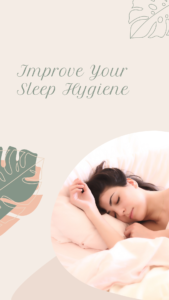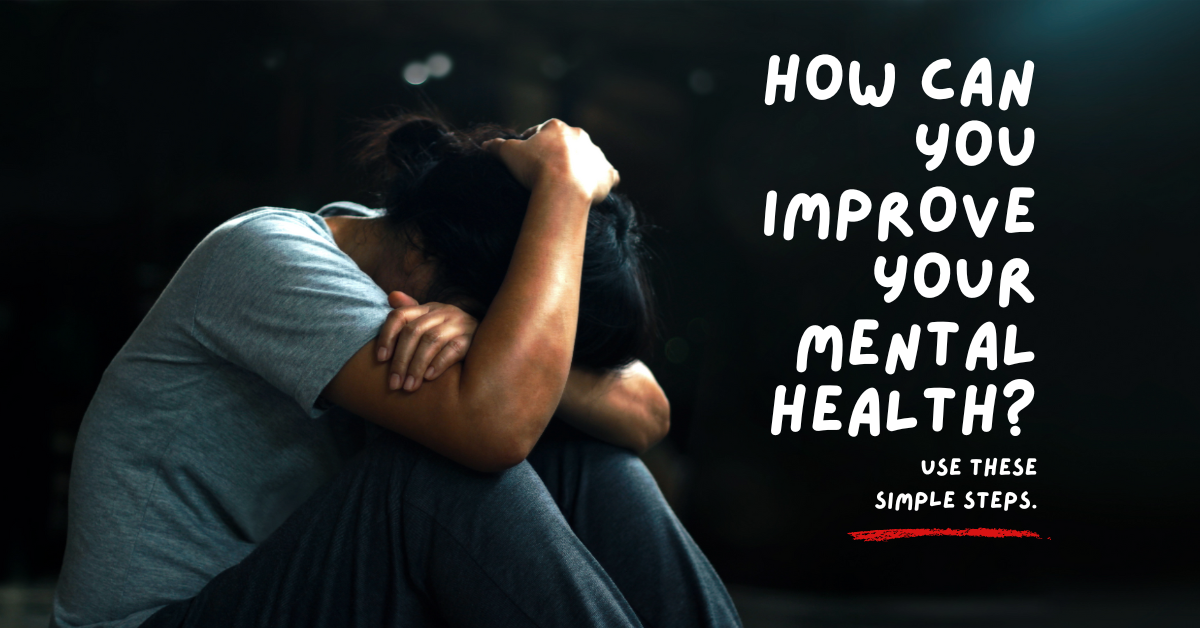How You Can Improve Your Mental Health With These Simple Steps
Warning: Possible trigger warning surrounding suicide awareness.
If you or someone you know is contemplating suicide, please call 988, or go to your nearest Emergency Room. You can also contact the National Suicide Prevention Hotline at 1-800-273-8255.
The big question is, “How can you improve your mental health?”
In recent years, there has been a lot of discussion surrounding mental health. Now, more than ever, people realize that taking care of yourself is not solely about your physical well-being but also about your mind.
In this article, I would like to share some tips for how to improve your mental health. It is easier than you think. You’ll be able to implement strategies now – today.
So let’s get to it.
The COVID-19 Pandemic And The Decline Of Mental Health
When COVID-19 hit, no one was prepared for its far-reaching impact. COVID-19 uprooted lives. Our daily lives were completely affected. Businesses shut down. Authorities forced people to stay away from one another, and they mandated us to wear masks. It makes sense then that, as a society, our mental health has declined.
The number of suicides, besides the greater increase in anxiety and depression, has jumped up, as well. The National Library of Medicine reports that suicide-related calls to a national crisis chat hotline service were 48% higher during the COVID-19 pandemic and lockdown.
As a side note, I am not minimizing how important it was to reduce the spread of the coronavirus. Yes, we took steps to ease the spread of the virus – it was a matter of survival. However, there are now other far-reaching consequences that we all need – and are forced – to deal with.
How Can You Improve Your Mental Health?
Each of us has a degree of mental health, whether it is good, poor, or somewhere in between. The mind-body connection is real, and when your mind experiences hardship, so does your body.
Have you ever noticed that when you are stressed or experiencing adversity, you often experience physical symptoms, too? Some of these symptoms may include:
- Poor sleep – insomnia or sleeping too much.
- Headaches.
- Stomach aches.
- Nausea.
- Apathy.
- Sleepiness.
- Tiredness.
- Exhaustion.
When your mental health deteriorates, your body follows suit, by exhibiting physical symptoms.
There are some simple steps that you can take to improve your overall mental health. It is just a matter of implementing techniques and taking action.
Get Back To The Basics To Improve Your Mental Health
Like any concept or idea, there are “gurus” and “experts” out there preaching their truth. You’ve heard of them. You know, buy this product, or do this or that, and you’ll feel better, you’ll be more productive, and you’ll live a better life.
I’m here to tell you that there is no magical pill or secret recipe.
The concept is not complicated. In fact, it is quite simple. You just need you to adopt the concept of simplicity, which is why we’ll focus on the basics.
Growing up, we learn how to take care of ourselves, right? As we get older, we easily forget some of those simple things we were taught as kids.
For example, let’s say you set a goal of climbing the corporate ladder. (As a side note, I am not deterring you from making goals and going after them. This is just a common instance to prove a point.)
For each new promotion, your employer assigns you more responsibility, which consumes more of your time. To get everything done in one day, you skip lunch, breakfast, or even dinner. Sometimes, the day will finish before you know it, and you’ll realize, “Shoot, I need to get some food. I haven’t eaten all day!”
Over time, adopting a routine such as this will have a huge negative impact on your mental health (and your waistline).
The concept of simplicity: do not overcomplicate things. Keep that in mind as we go forward.
1. Sleep Hygiene

It is absolutely imperative to maintain a healthy and restful sleep routine, which will allow you to function your best. You can do this starting tonight, by implementing these two simple techniques:
- Adopt a nightly routine. We all have different ways to get to sleep each night, but the goal should always be the same – to wind down. Experiment and find what works for you. Maybe you don’t eat after 6 p.m., or you take a hot shower. Perhaps reading a book or staying off your electronics at least an hour before bedtime will help. Try these different suggestions, or find your own. Maybe you need to do multiple things each night to decompress and calm down. Write down the techniques you try and how they help you. Either way, you can start trying tonight.
- Schedule consistent sleep and wake times. Determine a good bedtime and stick to it, at least as best as you can. The same goes for the morning – what is a good time for you to get up? After you set a sleep and wake times, follow them. Life happens, and sometimes your schedule will change, but that is okay. Just do the best you can, like with anything.
I highly suggest if you have any issue with sleep, talk to a doctor or other medical professional to rule out any sleep disorders. Nowadays, there are many options to treat any sleeping disorder. For example, it could be sleep apnea, insomnia, or a host of other possibilities.
2. Activity
Counting how many daily steps you take is a great way to help increase your activity level. Each day, I shoot for a goal of at least 10,000 steps, but I do my best to get more. For me, I take my dog out five or more times each day, since I love spending time with him and going for walks. When there is pleasant weather, I love to get outside, hike, and bike.
Some simple ways to get in more steps include taking the stairs instead of the elevator, parking farther away instead of up-close when you park your car, or biking instead of driving. Get creative, and reach your daily goal.
3. Exercising
There are many positive benefits to exercise, including but not limited to:
- More energy.
- Improved and restorative sleep.
- Increased libido.
- Regulated sugar levels.
- Improved mood.
- Decreased anxiety.
- Better focus.
- Stronger muscles.
Exercise is a part of living an active lifestyle. Finding exercise that you enjoy doing will help you adhere to a healthy lifestyle. After all, you don’t want to feel like it is a chore, but you eventually want to look forward to it.
Like the other suggestions on this list, do a little experimenting to find out what you enjoy and what fits with your schedule and your own lifestyle. What do you enjoy for exercise? Maybe it’s running, swimming, biking, or even rock climbing.
I love lifting weights, but I also enjoy running, biking, doing yoga, and working out with P90X3 at home. With my varied interests, I never get bored.
As a goal, I aim for a minimum of 10,000 daily steps, while following a weightlifting program.
4. Hydration
Most people do not get their required daily allotment of water. Since the human body is made up of about 75% water, you must get enough water so your body can operate efficiently.
The human body is constantly trying to get to a homogenized state of functioning, and water helps us to get there, for example, by ridding the body of toxins. Without proper hydration, the body can shut down. Even a slight state of dehydration can lead to headaches, fatigue, sleepiness, an apathetic mood, low sex drive, and much more.
As a side note, when I speak of hydration, I mean water. Soda, alcohol, and the like do not count. These can actually dehydrate you.
The take-home message is to avoid dehydration!
To get my daily water needs met, I drink a glass of water first thing when I get up in the morning, and I drink a glass of water with breakfast, lunch, and dinner. I also keep a water bottle (which holds about a liter of water) with me throughout the day, and I shoot to finish it and fill it at least three times.
I also make it a point to drink water right before my daily workout, as well as during and after it. Remember, our goal is to avoid dehydration, and sweating is a way to get dehydrated.
5. Good Food Choices

Make good food choices for all of your meals and snacks. Be smart about what you decide to eat and how much.
Remember, we as humans want to get to a homogenized state. Ingesting anything that unbalances the scale will force your body to work overtime to get it back to that regulated state.
It is important to remember that fact when you decide what to eat. For example, eating too much sugar will spike your insulin, followed by an enormous crash to re-balance that inner scale inside your body.
This is a good segway into the topic of diets. My suggestion is to stay clear of diets. It is never a good idea to restrict what you eat but only by how much.
For instance, don’t binge-eat on a sugar-dense pie. Instead, focus on moderation. Eat a slice of pie instead of the whole thing.
Again, it is more about the amount of food you eat in one sitting or the portion size.
For me, I look at food as a source of fuel to run my body efficiently. In that regard, I do my best to stay clear of processed foods that are packed with extra preservatives.
I eat fresh lean meat, such as chicken and turkey, fresh vegetables, and other whole grain options. Since moderation is my goal, I limit both my intake of sugar and caffeine, along with salt.
I have eliminated my alcohol consumption, as I dislike how it affects me. That being said, if you drink, my suggestion, again, is to keep it in moderation.
6. Healthy Connections
When I was younger, my Nana used to tell me I needed a minimum of 15 hugs each day to survive. She gave the best hugs, and I always welcomed them. I think there is a lot of wisdom in my Nana’s thoughts. I’m not saying that you should go up and hug a bunch of strangers, but we need a connection with others.
There are several ways that you can find a healthy connection, including with a family member, such as a parent or sibling. If you have an extended family, maybe it is a cousin, aunt, uncle, or grandparent.
Some of us do not have a relationship with our family, or they live too far away to visit regularly. In that case, you can connect with a close friend. Even interacting with a coworker or acquaintance is a means of connecting with others.
Just smiling at a stranger as you walk by acts as a brief, positive, and healthy connection.
A connection is not solely with another person. It can also be with a pet. I have had pets all of my life, and they are a part of my family.
7. Downtime
There is no avoiding stress, but downtime is a way to cope with and manage it. If you put too much stress on something over time, it will eventually crack or break, both literally and figuratively.

With our fast-paced lives, there is a short supply of time to just decompress. However, it is extremely important to make that time.
We all have different ways to relax and take it easy. Here are some suggestions to give you some ideas:
- Read a book.
- Watch a movie.
- Catch up on your favorite TV show.
- Soak in a hot bath.
- Paint.
- Write.
- Draw.
- Get a massage.
- Meditate.
- Watch the sunset.
- Stargaze.
- Cuddle.
There are countless ways to decompress, so this list is just to get you started thinking about them.
8. Journaling
I love to journal and write. I find getting my thoughts down on paper (or a Word document) extremely therapeutic. The actual act of taking an idea from inside my head and getting it written down takes pressure off my mind.
A lot of times, my inner dialogue and attempts to remember this and that increase anxiety. Writing helps ease my anxiety because I no longer have to force myself to remember something. That is probably why I love keeping lists. Then I don’t have that extra anxiety of trying to remember something.
Journaling is a way to get all my thoughts in a row. That way, my thoughts and ideas are literally in front of me, and I can organize them more efficiently. I can simply read them over and go from there.
9. Practicing Gratitude
Gratitude is a fantastic tool to improve your mental health. It is something that you can learn by teaching yourself. First thing in the morning, and before you go to bed, think about a list of five things you are grateful for. You can even write them down.
Getting into a habit of expressing gratitude is a way you can recondition your thinking in a more positive manner – thus improving your mental health. Nowadays, it is easy to look at what we don’t have or what we are lacking. Instead, try focusing on the things you do have, and express gratitude for them.
We all have a lot to be grateful for, even if it doesn’t “feel like it.”
Last Thoughts About How You Can Improve Your Mental Health
In this article, I spoke to you about improving your mental health by getting back to the basics and the importance of simplicity. Remember, these are simple concepts that you can implement today.
Focus on:
- Sleep Hygiene.
- Activity.
- Exercise.
- Hydration.
- Good Food Choices.
- Healthy Connections.
- Downtime.
- Journaling.
- Practicing Gratitude.
Experiment with each idea and incorporate them into your daily life. Keep a journal and note what helps you and what does not. Try to keep things simple, and do not overcomplicate them by thinking too much.
Find what works for you, and make each of these ideas part of your daily routine. Your mind and body will thank you!







